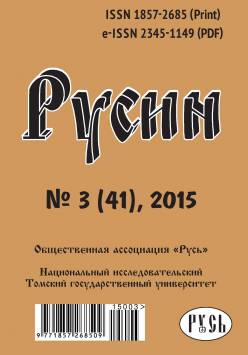Cognitive Processing of Marked and Unmarked Members of Grammatical Oppositions in the Russian and Bulgarian Languages
The article presents the results of the experimental analysis of the influence of the grammatical category markedness on their cognitive processing under competitive visual and auditory perception modalities. The cognitive analysis significantly enhances the structural, typological and communicative approaches to the study of markedness of grammatical category members. The research has tested the hypothesis that the auditory or visual perception process interacts with the nature of the formal representation of categorial semantics on the basis of Russian and Bulgarian grammatical systems. The psycho-1inguistic behavioura1 experiments conducted using the E-Prime 2.0 software package (Copyright 1996-2012 Psychology Software Tools) revealed the difference in the cognitive processing of marked and unmarked oppositiona1 members of the grammatical category of the genus and the lexico-grammatical category of animacy/ inanimacy of Russian and Bulgarian nouns. The differences in the speed of cognitive processing (the reaction time of the testees in so1ving cognitive tasks using the stimu1i opposed to this parameter) are manifested in the following: unmarked elements of the opposition are processed much faster than the marked ones. This pattern has manifested with grammatical gender (masculine lexemes are processed faster than feminine) as well as lexico-grammatical category of abstractedness. This pattern has manifested both a grammatical genus and a lexico-grammatical category of abstractness. The lexemes of the masculine gender are processed faster than those of the feminine gender, abstract nouns that are unmarked members of the opposition of the grammatical categories of the number (in Russian and Bulgarian) and definiteness (in Bulgarian) are processed more faster, too. These results are consistent with the conclusions of structural and communicative linguistics on the place and functions of unmarked members in the language system and in the communication system: unmarked meaning is the most natural and expected, therefore it requires less effort for its cognitive processing.
Keywords
русский язык, болгарский язык, грамматическая маркированность, маркированный член грамматической оппозиции, психолингвистический эксперимент, поведенческий эксперимент, бимодальное восприятие, Russian language, Bulgarian language, grammatical markedness, marked member of grammatical opposition, psycholinguistic experiment, behavioural experiment, bimodal perceptionAuthors
| Name | Organization | |
| Rezanova Zoya I. | Tomsk State University | rezanovazi@mail.ru |
| Nekrasova Elena D. | Tomsk State University | nekrasovaed@yandex.ru |
References
_6_2017_1508079193.jpg)
Cognitive Processing of Marked and Unmarked Members of Grammatical Oppositions in the Russian and Bulgarian Languages | Rusin. 2017. № 2 (48). DOI: 10.17223/18572685/48/9
